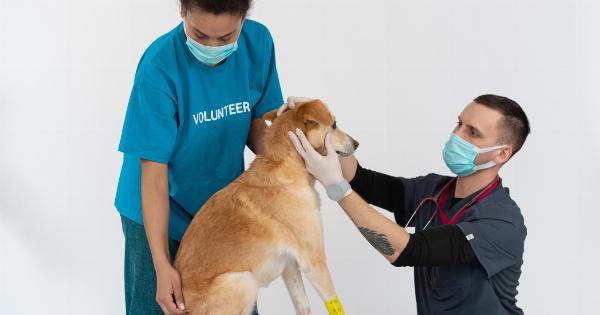Allergies can be a nuisance for many dog owners, causing discomfort and distress to their furry friends.
While there are various medications available to tackle these allergies, some pet owners prefer seeking natural remedies to alleviate their dog’s symptoms. In this article, we will explore ten natural dog remedies that can provide relief for allergies.
1. Coconut oil for itchy skin
Coconut oil is a versatile and popular remedy for many ailments, including allergies in dogs. Its antiviral, antibacterial, and anti-inflammatory properties can help soothe itchy skin caused by allergies.
You can apply a small amount of organic, cold-pressed coconut oil on your dog’s skin, gently massaging it in. This will provide relief and promote healing.
2. Apple cider vinegar to combat fleas
Fleas can worsen allergic reactions in dogs. Apple cider vinegar can help combat fleas as it acts as a natural repellent, making these pesky critters less likely to inhabit your dog’s fur.
Dilute apple cider vinegar with equal parts water and use it as a spray on your dog’s coat. Be sure to avoid your dog’s eyes and any open wounds to prevent stinging.
3. Probiotics for promoting gut health
Allergies can stem from imbalances in the gut microbiome. Probiotics can aid in promoting good bacteria growth and combating allergens. Look for probiotic supplements specifically designed for dogs or ask your vet for recommendations.
Additionally, feeding your pup plain, unsweetened yogurt can provide a natural source of probiotics.
4. Oatmeal baths for soothing irritated skin
Oatmeal has long been used to soothe itchy and irritated skin. You can create a soothing bath for your dog by grinding plain, unflavored oatmeal into a fine powder and adding it to warm water.
Let your pup soak in the oatmeal bath for 10-15 minutes before rinsing off. This remedy will help alleviate itching and reduce inflammation.
5. Chamomile tea for allergic reactions
Chamomile tea has natural antihistamine properties that can help reduce allergic reactions in dogs. Brew a cup of chamomile tea, let it cool down, and add it to your dog’s water bowl.
Ensure that the tea is completely cooled before giving it to your dog to drink. Not only will it provide relief, but it can also promote calmness and relaxation.
6. Raw honey for seasonal allergies
Raw honey, sourced locally, can help your dog build immunity to environmental allergens like pollen. The small amounts of pollen present in raw honey can act as a natural vaccine, reducing your dog’s sensitivity to these allergens over time.
Mix a teaspoon of raw honey into your dog’s food daily to potentially reduce symptoms caused by seasonal allergies.
7. Epsom salt soaks for paws
Allergies can cause irritation and redness in your dog’s paws. Epsom salt baths can help reduce inflammation and provide relief. Fill a basin with warm water and dissolve Epsom salt in it. Soak your dog’s paws in the solution for a few minutes.
Gently pat their paws dry afterwards. This remedy should alleviate discomfort and keep their paws clean.
8. Essential oils for calming allergies
Some essential oils, such as lavender and chamomile, can have calming effects on allergies. However, it is important to use them properly and with caution. Dilute a few drops of essential oil with a carrier oil, such as coconut or olive oil.
Apply the mixture to your dog’s collar or a bandana, allowing them to inhale the scent. Always consult a veterinarian before using essential oils on your pet.
9. A balanced diet for overall health
A well-balanced diet plays a significant role in maintaining your dog’s overall health, including their immune system.
Ensure that your dog’s food contains essential nutrients, including omega-3 fatty acids, which have anti-inflammatory properties. Consult a veterinarian to create a suitable diet plan tailored to your dog’s specific needs.
10. Regular grooming for allergen control
Allergens can accumulate in your dog’s coat and exacerbate allergic reactions. Regular grooming, including brushing and bathing, can help reduce the amount of allergens present on your dog’s fur.
Use a brush specifically designed for your dog’s coat type to remove loose hair and dander. Additionally, consider using hypoallergenic shampoos to minimize skin irritations.





























